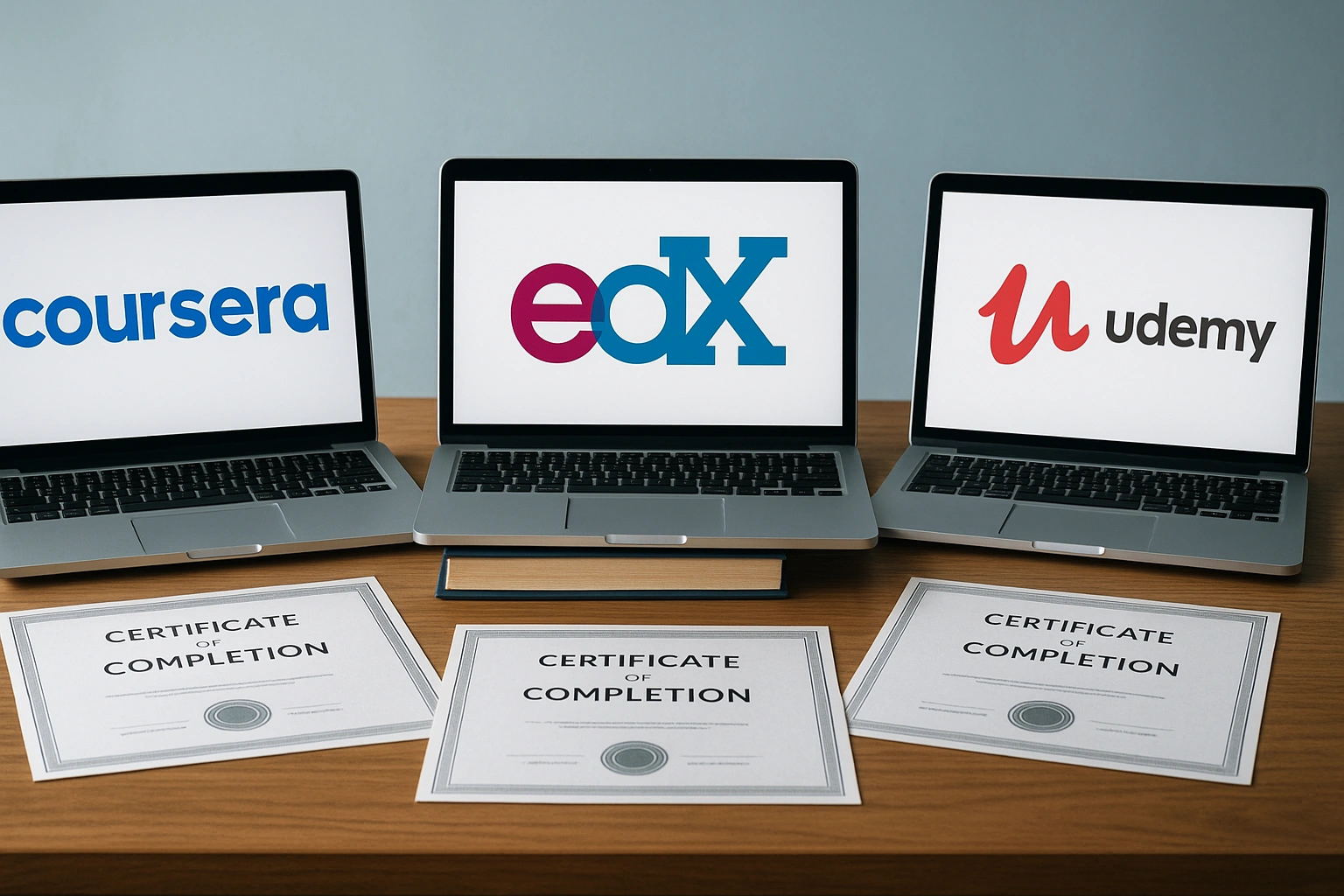The world of work is evolving at lightning speed. Skills that were highly sought after five years ago are now standard, while new technologies are creating roles that didn’t exist a decade ago. In this fast-changing landscape, continuous learning is no longer optional—it’s essential. Platforms like coursera edx udemy make it easier than ever to upskill and stay relevant. Whether you want structured programs, academic rigor, or practical skill-building, coursera edx udemy has options for every learner. Choosing the right course on coursera edx udemy can help you advance your career efficiently. By exploring coursera edx udemy, you can take control of your growth and ensure you’re prepared for the jobs of the future.
You’re faced with a sea of online learning options, and three giants stand out: coursera edx udemy. This is the classic coursera edx udemy debate, an important decision for anyone looking to upskill efficiently. Do you choose the university-backed programs on coursera edx udemy, the academically rigorous courses from edX, or the practical, skill-focused offerings on Udemy? Making the right choice among coursera edx udemy ensures your time, money, and effort lead to meaningful results and career growth.
This guide is your definitive roadmap to online learning. We’ll explore the strengths and weaknesses of coursera edx udemy, compare the learning styles and course offerings across coursera edx udemy, and provide insights to help you pick the right platform. Understanding how coursera edx udemy differ in pricing, certification, and content quality ensures you make a choice aligned with your goals. By examining all aspects of coursera edx udemy, you can confidently select the platform that maximizes both your learning and career growth.
- What Are These Platforms Anyway? The MOOC Revolution on Coursera edX Udemy
- Why Your Choice of Platform Matters
- The Contenders: A Deep Dive into Each Platform
- Feature Showdown: Coursera vs. edX vs. Udemy
- 7 Common Mistakes to Avoid When Choosing an Online Course
- Expert Tips for Online Learning Success
- Frequently Asked Questions (FAQ)
- Conclusion: The Best Platform is the One That’s Right for You
What Are These Platforms Anyway? The MOOC Revolution on Coursera edX Udemy
Coursera, edX, and Udemy are all leaders in the world of MOOCs, or Massive Open Online Courses. These are courses delivered online and accessible to anyone, anywhere, often for a fraction of the cost of traditional university tuition. They represent the democratization of education, bringing world-class learning out of the ivory tower and into your living room.
The e-learning market has exploded into a multi-hundred-billion-dollar industry, a trend accelerated by the global shift to remote work and learning. As a Statista analysis shows, the demand for online skill development is at an all-time high. This makes the **platform comparison 2025** more critical than ever, as these platforms are no longer just for hobbyists; they are vital tools for career advancement.

Why Your Choice of Platform Matters
Choosing a platform isn’t just about the course content; it’s about the entire learning ecosystem and how it aligns with your goals.
Academic Prestige vs. Practical Application
Your choice depends on what you need to learn. Are you looking for a deep, theoretical understanding of a subject, or do you just need to learn how to use a specific piece of software by this Friday? Platforms like Coursera and edX excel at the former, while Udemy is the champion of the latter.
The Value of the Certificate
A certificate from a course taught by Google on Coursera or Harvard on edX carries significant weight with employers. A certificate from an unknown instructor on Udemy might be less impactful on your resume but could provide more direct, practical skills. Understanding this difference is key to a good **MOOC review**.
Budget and Learning Style
Do you prefer a structured, semester-like experience with deadlines, or a self-paced course you can buy once and access forever? Do you want to pay a monthly subscription or a one-time fee? Each platform has a different model that will suit different budgets and learning styles. For more on how to invest in your education, you can explore resources like infoinaja.com.
The Contenders: A Deep Dive into Each Platform
Coursera: The Online University Campus
Coursera partners with over 200 of the world’s top universities and companies (like Yale, Google, and IBM) to offer a highly structured and credential-focused learning experience. It’s the best choice for those seeking a resume-boosting certificate or even a full online degree.
- Best For: Career changers, degree seekers, and anyone wanting a university-branded credential.
- Pricing: Subscription-based (Coursera Plus), per-course payments, and full tuition for degree programs. Free auditing is available for many courses.
- Key Feature: Professional Certificates. These are multi-course programs designed by industry leaders like Google and Meta to prepare you for specific entry-level jobs.
edX: The Academic Powerhouse
Founded by Harvard and MIT, edX is a non-profit platform with a focus on rigorous, deep academic learning. While it also partners with top universities, its ethos is more focused on the pursuit of knowledge itself. It’s the best choice for learners who want a challenging, university-level education.
- Best For: Academically-minded learners, students looking to supplement their university studies, and those seeking deep expertise.
- Pricing: Most courses can be audited for free. To get a verified certificate and access to graded assignments, you pay a one-time fee per course.
- Key Feature: MicroBachelors and MicroMasters programs. These are series of graduate-level courses that can earn you a valuable credential and can often count as credit towards a full Master’s degree.
Udemy: The Open Marketplace of Skills
Udemy is a completely different beast. It’s a massive open marketplace where anyone can create and sell a course. This results in a staggering library of over 200,000 courses on every imaginable topic, from Python programming to sourdough baking. It’s the best choice for practical, hands-on skills taught by real-world practitioners.
- Best For: Hobbyists, professionals needing to learn a specific tool quickly, and budget-conscious learners.
- Pricing: Per-course payments with lifetime access. The key is to wait for one of their frequent, massive sales, where top-rated courses can be bought for $10-$20.
- Key Feature: Variety and Practicality. You can find a course on virtually anything, taught by someone who is an expert in that specific niche.
Feature Showdown: Coursera vs. edX vs. Udemy
Here’s a head-to-head comparison of the key features.
| Feature | Coursera | edX | Udemy |
|---|---|---|---|
| Course Source | Top Universities & Companies | Top Universities & Institutions | Individual Experts & Practitioners |
| Pricing Model | Subscription / Per Course | Per Course (Free to Audit) | Per Course (Frequent Sales) |
| Certificate Value | Very High | Very High | Low to Medium |
| Learning Style | Structured, Academic | Highly Academic, Rigorous | Practical, Skill-Based, Self-Paced |
| Best For | Career-focused credentials and degrees. | Deep academic learning and university-level courses. | Learning a specific, practical skill quickly and affordably. |
7 Common Mistakes to Avoid When Choosing an Online Course
Don’t let your enthusiasm lead you astray. Avoid these common pitfalls:
- Buying a Udemy Course at Full Price: Udemy has a major sale almost every other week. Never pay the full list price. Add a course to your wishlist and wait for the inevitable discount.
- Not Auditing First: On Coursera and edX, always audit a course for free before you pay. This lets you watch the lectures and see if the instructor’s teaching style works for you.
- Ignoring Course Reviews and Ratings: This is especially critical on Udemy. Read the most recent reviews (both positive and negative) to get a real sense of the course’s quality.
- Choosing a Course That Hasn’t Been Updated: Technology changes fast. For a technical subject, make sure the course has been updated within the last year or two.
- Underestimating the Time Commitment: A university-level course on Coursera or edX is a serious commitment, often requiring 5-10 hours per week. Be realistic about what you can fit into your schedule.
- Signing Up for a Subscription You Don’t Use: A Coursera Plus subscription is a great value if you’re taking multiple courses, but it’s a waste of money if you’re not actively learning.
- Focusing Only on the Certificate: The primary goal should be to acquire the skill, not just to get the piece of paper. Engage with the material, do the projects, and focus on learning.
Expert Tips for Online Learning Success
“The most effective online learners are strategic. They use a ‘hybrid’ approach. They might take a foundational, theoretical course on Coursera or edX, and then supplement it with a practical, tool-based course on the same subject from Udemy to get the best of both worlds.”
— Dr. Anya Sharma, Education Technology Researcher (Simulated)
- Schedule Your Learning Time: Block out specific times in your calendar for your coursework, just as you would for an in-person class.
- Engage in the Community: Use the course forums. Asking questions and helping other students is a powerful way to solidify your own learning.
- Apply What You Learn Immediately: If you’re learning a new skill, immediately start a small personal project using that skill. This is the fastest way to make it stick.
- Add Your Certificates to LinkedIn: This is a powerful signal to recruiters that you are a proactive lifelong learner.
Frequently Asked Questions (FAQ)
Which platform is best for getting a certificate that employers will recognize?
For employer recognition, Coursera and edX generally have the edge. Their partnerships with top universities and major companies (like Google, IBM, and Microsoft) mean their Professional Certificates and MicroMasters programs carry significant weight on a resume.
Can I get a real degree on these platforms?
Yes, both Coursera and edX offer fully accredited online Bachelor’s and Master’s degrees from reputable universities around the world. These are not just certificates; they are the same degrees that on-campus students receive.
Which platform is the most affordable?
Udemy is generally the most affordable, especially for individual courses, due to its frequent and deep sales where courses can be purchased for as little as $10-$15 with lifetime access. Coursera and edX offer free auditing, but verified certificates and graded assignments require payment.
What is ‘auditing’ a course?
Auditing a course, a feature primarily on Coursera and edX, allows you to access most of the course materials—like video lectures and readings—for free. However, you will not be able to submit assignments for grades or earn a certificate.
Is Udemy accredited?
No, Udemy is not an accredited institution. It is a learning marketplace where individual experts create and sell courses. While many courses are of high quality, the certificates of completion do not carry academic credit.
